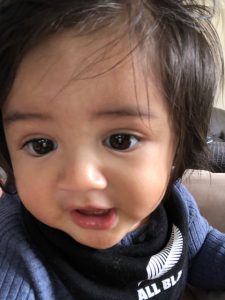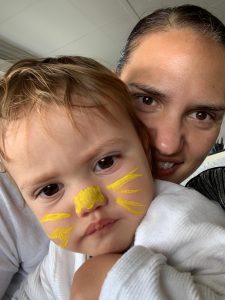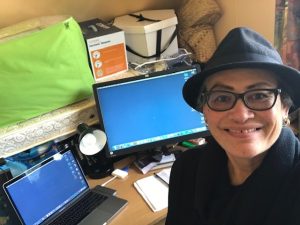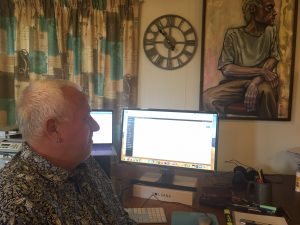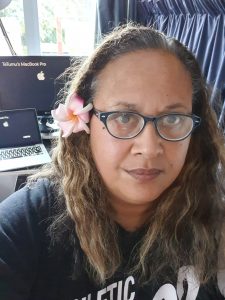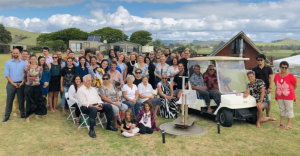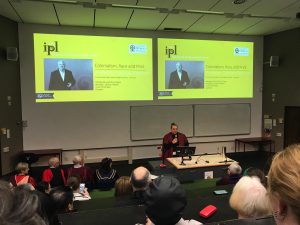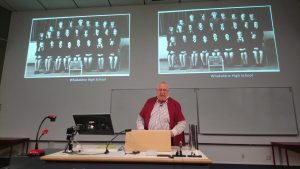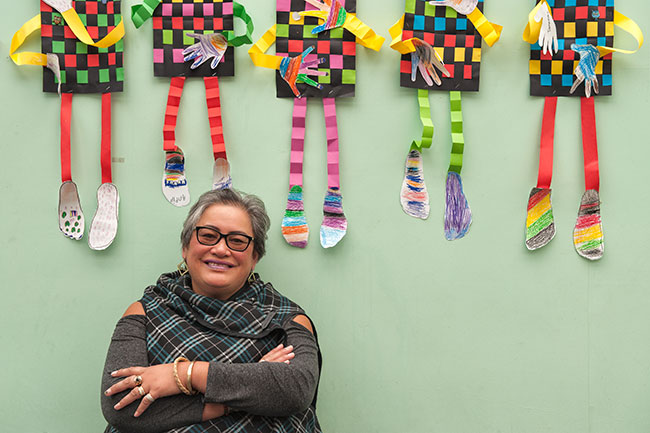Te Tumu Research Under Lockdown
The Lockdown has proved hugely disruptive to all Te Tumu staff, impacting on all aspects of our academic lives, including research. We now move from Lockdown to Level 3 – which so far doesn’t look too much different for us. Despite this, we have still been managing to keep our research productivity going, hopefully with some “outputs” in the offing.
To find out a little bit more, I sent out a request to staff to send in a few details on the highs and lows of their research during lockdown.
First, let’s talk about some of the problems. Some staff talked of getting “zui’d out”, i.e. too many Zoom hui. There’s been some research on how tiring Zoom meetings can be, and what with teaching online, staff and school meetings, supervision get-togethers, and other hui, it can seem like some days we are constantly on Zoom. Then there’s the extra effort preparing for online teaching, especially in the reo classes where you need to convert the quick-flowing quick-changing interactive tasks into online teaching activities.
Then there are the events that have been cancelled or deferred, such as Poia Rewi’s Māori language symposium that he had planned with the Government Department Collective, and Michelle Schaaf’s planned delivery of Summary Report for ‘Childhood in a Changing Pacific’: Samoa and Dunedin to Pacific communities in Samoa and Dunedin. Lachy Paterson had also been planning to kick off his upcoming research and Study Leave (RSL)with a couple of conferences in France, but these have both been cancelled.
Then there’s working from home. Three of our staff have young children also locked down with them, which creates its own complications. As Karyn says, she has also been “researching meal plans for a fussy eater and activities to keep a 13 month old entertained” – hard work when “food still refuses to get eaten and suggested activities don’t keep her attention for longer than 5 minutes!!” And one person complained (was it a complaint?) that “My new office space is far too close to the pantry”.
So if those were the lows, what were the highs?
Poia says he is pleased that Gianna Leoni and Tangiwai Rewi have come on board the Te Reo Me Ngā Tikanga Māori Platform for 2020 research, looking at the impacts of research by researchers under Ngā Pae o te Māramatanga. Gianna is also feeling chuffed that she has finished a research proposal she had been needing to do for a few months – and having it accepted.
Tangiwai, as Chair of the Te Tumu Research Committee, also organised a “Hot Tips” Zoom session with staff earlier this month, on how to enhance their applications for University of Otago Research Grants (UORGs). We were really pleased to have the ebullient Humanities Associate Dean (Research), James Maclaurin there to share his knowledge with us.
Both Lachy and Tangiwai are on RSL next semester, so have been revising their travel, and research and writing plans, which has been difficult given that no one knows how long we will be in Level 3, or when normality will return.
Lachy has been organising getting the proofs and indexing for a new edited collection on Indigneous textual cultures, which will hopefully be out in September. See here for more info. He been working on the Te Hau Kāinga/Māori Home Front project, including translating the blog posts. If you haven’t read the latest ones (in English or Māori) then check them out at the project website. You can also listen to him and Angela Wanhalla promoting the project on Radio New Zealand’s Saturday Morning programme on Anzac Day: Lachy has also been asked to submit an abstract for a chapter on Māori newspapers in The Edinburgh Companion to British Colonial Periodicals.
Michelle has been busy transcribing interviews, sorting participants’ diaries and personal papers collected during her recent RSL, in preparation for UORG application. She is also part of a team who have just completed the Summary Report for Childhood in a Changing Pacific: Samoa and Dunedin. She has also been chosen to write a chapter for an e-book for Bridget Williams Books on “’Thesis Survivor Stories”, to be published in June.
Megan Pōtiki is busy on finishing her thesis. She recently published “Te hū o Moho: The call of the extinct Moho: The death of the Māori language at Ōtākou” which appeared in the latest issue of Te Pouhere Kōrero.
Lyn Carter has completed a journal article during the Lockdown, which she has sent off to a Sami journal. Otherwise, she says, she has been having lots of Zoom meetings with various research clusters around climate change and health/climate change and environment, including on her National Science Challenge projects, Building Better Homes, Towns and Cities, and BioHeritage.
Building on her publishing success from last year, Telesia Kalavite, is currently writing a journal article for the New Zealand Journal of Educational Studies. She is also one of the principal applicants for a successful grant application for Humanities Research Network with an amount of $10,000 for 2 years. The name of the project is: “Pacific Thought Network (PacTNetwork)”. Telesia is now developing an application for UORG grant to further her research.
Our newest staff member, Vaivaimalemalo Michael Ligaliga, has been very busy. He has been developing a book proposal for Palgrave Macmillan based on his PhD thesis, as well as a UORG application. Michael has also been working on a chapter on the Samoan perspective on addressing domestic or family violence for the Handbook of Positive Peace , and another for Decolonizing Indigenous Research Methodologies in Peace and Conflict Research.
Michael Reilly has been continuing his work, writing chapters about Māui Pōtiki, one on a Ruapuke Island narrative, and another looking at two stories by Mohi Ruatapu. His aim is to incorporate these chapters into a book about Maori tribal traditions, perhaps with Auckland University Press, building on the kind of topics he has taught in his MAOR207 and INDV307. Michael has also been asked to contribute a chapter on emotions in the Pacific and Australia for an edited book, The Routledge Modern History of Emotions.
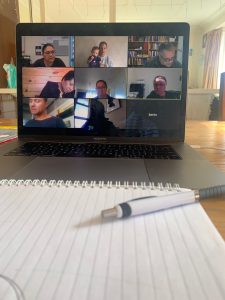
Perpetual hui on Zoom! Here Karyn and Manuhou are attending a board meeting for Te Rūnanga Māori of Ako Aotearoa.
The Lockdown has disrupted Karyn’s Marsden research, so she’s been busy working on a new plan, and catching up on some of her reading. She has recently been published by Lancet Oncology. This came from an invitation to her and her collaborators to the International Gastric Cancer Linkage Consortium in Wānaka last year to share their research on updating the international practice guidelines for Hereditary Diffuse Gastric Cancer. Karyn is currently working on the final draft of a book chapter she is co-writing with Marcelle Wharerau (ex-Te Tumu student, now teaching at Waikato University) on subversive pedagogies entitled, “Tūngia ki te marae, tau ana – culturally transformative learning in universities”.
Paerau Warbrick was enjoying his RSL when the Lockdown was imposed, focusing his research on historic Māori elections, and the lawsuits that often went with them. He has just finished a draft article on the 1876 Eastern Maori election petition involving Hēnare Pōtae, Rōpata Wahawaha and Karaitaina Takamoana and the 1887 Northern Maori election petition involving Hirini Taiwhanga and Wī Kātene. Paerau is also working on an article on the monumental election battles between Wī Pere and James Carroll in the 1884, 1887 and 1890 elections, and making the finishing touches to another article regarding the UK Supreme Court and how it should take lessons from the NZ Court of Appeal Maori Council case of 1987 and the Foreshore and Seabed case of 2003.
Wherever you are, I hope you are all staying safe and keeping well, and being productive with your research (if that’s your thing).
First Te Tumu Seminar for 2020
Many people will remember Suzanne Duncan (Te Rarawa, Te Aupōuri), a former student, and lecturer at Te Tumu. She left a few years ago to return to her rohe ā-iwi, the Far North, where she works in Kaitaia as Principal Strategist for Te Hiku Media. Suz will be back in Dunedin next week with the General Manager, Peter-Lucas Jones (Ngāi Takoto, Te Rarawa, Te Aupōuri, Ngāti Kahu); they are presenting the first of Te Tumu’s seminars this year on the amazing work being done at Te Hiku [see abstract below].
Where: Te Paparewa (RGS2 – ground floor of Te Tumu).
When: 3.30pm, Wednesday 4 March.
Abstract: Te Hiku Media is a not-for-profit charitable trust belonging to the five iwi of the Far North, Ngāti Kuri, Te Aupōuri, Ngāi Takoto, Ngāti Kahu and Te Rarawa. Founded as an iwi radio station in 1991, Te Hiku Media has grown as an iwi broadcaster to include regional news, the live streaming of nationally significant events, Māori language archiving and the development of natural language processing tools for the revitalisation of te reo Māori. This seminar will share the journey that has been led by their kaumātua and outline their recently awarded $13 million dollar data science project, Papa Reo.
He whakamāori i te reo Kariki o neherā
Kia ora koutou.
For those of you into te reo Māori and translation, there is a plenary talk at the 2020 Annual Conference of the Australasian Society for Classical Studies on 31 January that might interest you. This is a public event!
Associate Professor Simon Perris: Te Iriata and the Iliad: On translating Homer into Māori.
Friday 31 January 2020, St David Lecture Theatre, 9am.
“This talk concerns a collaborative and creative research project being undertaken by myself and my colleague Dr Karena Kelly (Te Kawa a Māui, Victoria University of Wellington). This nascent project is intended to produce a translation of (some of) Homer’s Iliad into te reo Māori – into Te Iriata. As far as we know, this is the first-ever direct translation of a non-biblical ancient Greek text into Māori.
“In this talk, I will introduce the project, describe our working methods, survey some of the challenges Dr Kelly and I have encountered, and address some of the central methodological, linguistic, and other issues at stake; I will also share some specific sections of the work to date, and address more broadly the idea of a classical tradition in Māori translation.”
See ClassicsConferencePoster for all three public events from this conference.
Manu narratives of Polynesia
Te Tumu would like to congratulate Raphael Richter-Gravier, one of our stellar postgraduate students, for having completed all the post-examination formalities for his PhD on “Manu narratives of Polynesia: a comparative study of birds in 300 traditional Polynesian stories“.
Raphael was supervised by Professor Michael Reilly and Dr Michelle Schaaf from Te Tumu, and through a co-tutelle arrangement, also by Professor Bruno Saura from the University of French Polynesia. Raphael’s research is comprehensive and in-depth, looking at a wide range of bird stories on a number of themes from all around Polynesia, including Aotearoa.
If you are interested in delving into some of the stories, or reading Raphael’s thesis in its entirity, it is now available online on the university’s OUR Archive. Click here to access it.
Raphael will be graduating in December, and is planning to publish from his research.
3 Summer Scholarships for Māori students
The Te Hau Kāinga team are looking for three Māori students (second year or higher in 2019) for some amazing research-based work over the 2019-2020 summer break. There are two main options. One is to develop a project in your home area to look at how the Second World War affected the whānau and communities there. The output can be a written report, a mōteatea, a video (or something else) that can be shared with your whānau. The other is to undertake archival research within an archive, such as the Hocken Collections, or Ngā Taonga Sound and Vision. If you are curious, or want to discuss an idea, or find out more, contact the project leaders. Click here for more information, or to apply.
Website now live for Te Hau Kāinga project
 The website for the Te Hau Kāinga project went live this week. Te Hau Kāinga is a Marsden-funded research project led by Angela Wanhalla (History) and Lachy Paterson (Te Tumu) investigating the impacts of World War Two on Māori who remained in New Zealand during the conflict, either in their home communities, or working away from home. Designed by local web design company, Myth, the website is fully bilingual. It features a photo gallery, and a “stories” section, as well as a page where interested people can upload their own whānau stories and photographs. Check it out – click here. As stories get added to this site, links to these will be posted to the project’s FaceBook and Twitter pages. Feel free to follow these to find out more as the project rolls out.
The website for the Te Hau Kāinga project went live this week. Te Hau Kāinga is a Marsden-funded research project led by Angela Wanhalla (History) and Lachy Paterson (Te Tumu) investigating the impacts of World War Two on Māori who remained in New Zealand during the conflict, either in their home communities, or working away from home. Designed by local web design company, Myth, the website is fully bilingual. It features a photo gallery, and a “stories” section, as well as a page where interested people can upload their own whānau stories and photographs. Check it out – click here. As stories get added to this site, links to these will be posted to the project’s FaceBook and Twitter pages. Feel free to follow these to find out more as the project rolls out.
Colonialism, Race, Print and Intestinal Fortitude
[From Professor Poia Rewi]
On Monday, 29 July 2019, Archway 1 was treated to a powerful inaugural professorial lecture by Professor Lachlan (Lachy) Paterson. Vice Chancellor, Professor Harlene Hayne, welcomed whānau stretching from Dunedin to the Bay of Islands and Tasmania; and University of Otago academics and friends to hear some strong messages on subject matter that requires careful navigation and courage.
Lachy duly acknowledged his whānau, senior leaders and colleagues in Te Tumu and across the wider university. He also made a special ‘shout out’ to client services staff who, as he said, “without them, the University would grind to a halt”.
Being promoted to Professor this year, Lachy, a non-Māori, a self-proclaimed Pākehā New Zealander ensconsed in Māori language texts, Māori-language print culture; the Treaty of Waitangi and Māori social, cultural, political and religious history, courageously and non-hesitantly gave his lecture on these topics; an academic historiography that demonstrated the multifarious nature of his teaching, research and engagement.
His lecture began with discourses from government newspapers published in the mid-1800s, and the nature of colonial racial discourse, in which Māori identity and culture was portrayed. He then discussed Māori and Pākehā attitudes towards race mixing. He concluded by extending a challenge that ‘we need to be vigilant and challenge any racist ideas that might re-appear today’.
This evocative conclusion rounded off a well-received lecture. His sustained high delivery and performance across research, teaching and community service provided the strong foundation upon which the University of Otago Promotions committee promoted him from Associate Professor to Full Professor in 2019.
After his lecture, attendees were invited by Prof. Tony Ballantyne to the University of Otago Staff Club for refreshments and to reconnect as friends and colleagues and continue conversations on the content they were privileged to hear.
Upon reflection of the lecture, his tuakana Gavin aptly summised, “ If more people took on board what Lachy talked about today, what better place than New Zealand would there be for people to live in harmoniously”.
More graduation success for Te Tumu
Being able to highlight student success always brings great pleasure to Te Tumu. This May we have ten students completing their degrees in May. Thomas Aerepo-Morgan (Ngāi Tahu, Waikato, Ngāti Whakaue, Kuki Airani), Maramena Tuna (Tūhoe) and Kaahu White (Ngāi Tahu, Te Rarawa) graduate with a BA in Māori Studies. Thomas is currently pursuing a Master of Indigenous Studies degree, and Maramena is teaching our MAOR108 (Waiata) paper. Liam Gillan-Taylor (Pākehā), Brogan Handcock (Ngāti Tūwharetoa, Ngāti Kahungunu, Pākehā), Jade McCaughan (Pākehā), Tiana Matthews (Ngāti Kahungunu, Ngāti Tūwharetoa, Ngāti Porou, Pākehā) and Isabel Moore (Ngāti Porou, Pākehā) all graduate with a BA in Indigneous Development/He Kura Matanui. Two students (below) are graduating with PhDs. We wish all our graduates future success wherever their skills and knowledge take them.
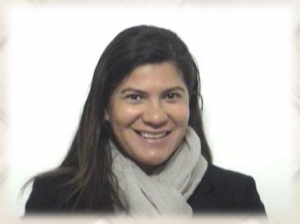 Emma Dunlop-Bennett (Ngāti Maniapoto, Samoan, Pākehā) undertook her doctorate, “Through their eyes: a Samoan perspective on child wellbeing”, while based principally in Wellington. Emma’s supervisors have included Assoc Professor Jenny Bryant-Tokalau, Dr Michelle Schaaf, Assoc Professor Bev Lawton and Professor Tony Dowell.
Emma Dunlop-Bennett (Ngāti Maniapoto, Samoan, Pākehā) undertook her doctorate, “Through their eyes: a Samoan perspective on child wellbeing”, while based principally in Wellington. Emma’s supervisors have included Assoc Professor Jenny Bryant-Tokalau, Dr Michelle Schaaf, Assoc Professor Bev Lawton and Professor Tony Dowell.
Her abstract reads: Child wellbeing is the subject of a considerable body of research and policy making globally, and in New Zealand today. Despite its extensive use, the concept of child wellbeing is used differently across disciplines and across diverse social and cultural contexts. Little of the extant literature recognises the influence of ‘other’ worldviews, cultural beliefs, values, and ways of knowing. Further, the voices of children are largely missing in the child wellbeing debates, despite the fact that children are able to offer authoritative knowledge of their world and of their experiences. A review of the literature on Pasifika, children and childhoods, and wellbeing, highlights that there is currently no literature in New Zealand that connects these three areas together. This is the gap where this research contributes new knowledge to understanding – from the standpoint of Samoan children and their parents living in Wellington – how they conceptualise child wellbeing. The Samoan diaspora is the focus of this research given the diversity that exists within Pasifika.
Guided by the Talanoa ile i’a (Faleolo, 2009), this exploratory research positions children as ‘experts’ on their wellbeing and creates the space for them to share their knowledge. The Samoan children do so through combining Samoan (talanoaga) and Western (photovoice) research methods. The Samoan children took 10 photos of what made them feel ‘happy, safe, and loved’, which they used to guide their talanoa. The views of their parents were elicited through talanoaga.
From the talanoaga, the Samoan children defined their wellbeing as “a bunch of stuff that has good bits and bad bits”. This definition picks up the relational aspect of wellbeing as well as resilience. Four factors are important to their wellbeing, which are: social connections, not having to worry, feeling valued and included, and being a good person. Connecting with people, particularly their family, stands out as being of overwhelming importance to their wellbeing. The Samoan children bring these ideas together conceptually as a seesaw in a playground. Parents conceptualise the wellbeing of their children as ola manaia or the beautiful life. They see their main role as laying the foundations on which their children could have a beautiful life. For many parents, they are drawing on the fa’asamoa and the way in which they have been raised, but ‘tweaking’ this to account for shifts in the broader context. Of note, parents view wellbeing in terms of their children being happy and emotionally stable, being good people, having values, and that they do something meaningful with their lives that they were passionate about. The talanoa from the parents are woven together as the Ola Manaia model that captures the importance of resilience and the relational aspect of wellbeing.
This research has significance in terms of adding to the community, national and global body of knowledge on child wellbeing. This is the first New Zealand study of the wellbeing of Samoan children that gives priority to the voices of children. In doing so, it adds the child’s voice as well as the ‘other’ to the child wellbeing literature, and does this in a holistic way that takes account of the multi-dimensional aspect of child wellbeing. Further, this research reinforces that, when given the opportunity, children are able to make an incredible contribution to issues that affect them.
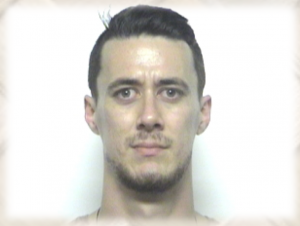 Paratene (Hirini) Tane‘s thesis topic discusses “Whakapapakainga: a template for the cross-generational development of marae-communities.” Hirini’s supervisors include Professors Paul Tapsell, Merata Kawharu and Poia Rewi.
Paratene (Hirini) Tane‘s thesis topic discusses “Whakapapakainga: a template for the cross-generational development of marae-communities.” Hirini’s supervisors include Professors Paul Tapsell, Merata Kawharu and Poia Rewi.
His abstract explains: Through case study research located in Northland, New Zealand, this thesis investigates the future of papakāinga (kin-community settlements) and their marae (ancestral centres of tribal identity). Māori kin-communities have transformed in response to crisis and opportunity over generations. Due to historical impacts of Māori land alienation, individualisation, and Māori urbanisation, the binding fabric of papakāinga – kinship and economy – has weakened.
‘Whakapapakāinga: a template for the cross-generational development of marae-communities’ investigates the concerns and hopes of the descendants of Oromahoe regarding the future of their papakāinga. It uses interviews with elders, a Māori land trust; a questionnaire with community descendants (local and non-local), archival research, and reflexive ethnography. The key finding of this research investigation is that papakāinga development should innovate within central needs – energy, housing and food – that restore economy around papakāinga and reactivate functional kinship links between community members.
This thesis is a study in the field of the target audience. The findings are to assist the Oromahoe Trust, the Oromahoe marae and its descendants (local and non-local) in shaping a strategic direction for their ancestral settlement, their papakāinga. The findings also provide an kin-insider approach to papakāinga development for housing development agencies, district and regional councils, funding agencies, banks, architecture firms, solar technology suppliers and Māori and non-Māori agricultural and horticultural enterprises that neighbour papakāinga. It is important not only to New Zealand’s 778 papakāinga, but also small indigenous communities elsewhere in the world facing similar crises of relevance to descendant diasporas, identity and development.
Mātauranga Māori at Otago
Te Tumu’s Dr Tangiwai Rewi’s research on Māori education features in the latest He Kitenga issue on Mātauranga Māori. Click here for the full story, as well as other amazing Māori research at the University of Otago.
Call for Applications for PhD: Māori Literature and the News
There is an exciting opportunity for someone to do a PhD on “Māori Literature and the news”, as part of a Marsden project headed by Associate Professor Jacob Edmund (English and Linguistics, University of Otago).
See: PhD scholarship in Māori literature and the news for details.
Please circulate this on your own networks, or forward to anyone you think might be interested.

